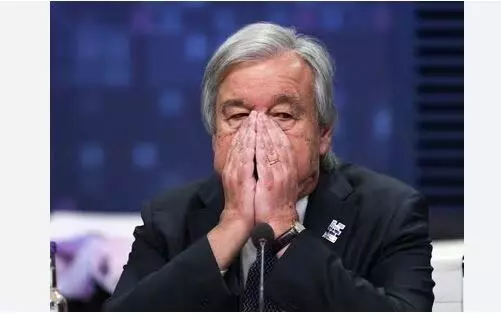
Tainted resolution: US wants no ceasefire, Guterres doubts effectiveness of humanitarian aid
text_fieldsOnce again, the double standard of the US is exposed as it opposed the UN resolution for an immediate suspension of Israeli bombardment, while the UN Security Council passed a resolution only to increase humanitarian aid in Gaza, conceding to the US veto power.
The Biden administration also insisted on the removal of a clause that would grant the UN exclusive control over humanitarian deliveries, asserting that such oversight was unnecessary.
The resolution focuses on facilitating the large-scale delivery of aid to Gaza to avert the imminent threats of famine and deadly epidemics. It calls for the immediate appointment of a UN humanitarian coordinator to lead efforts in increasing the current meagre flow of supplies into the region.
The resolution emphasizes the need for parties involved, notably referencing Israel without explicitly naming it, to provide full cooperation to the appointed coordinator.
UN Secretary-General António Guterres expressed scepticism about the resolution's effectiveness without a concurrent ceasefire. On social media, Guterres emphasized that a humanitarian ceasefire is essential to meet the desperate needs of the people in Gaza and end their ongoing nightmare.
He criticized Israel's offensive tactics, stating that they create significant obstacles to the distribution of humanitarian aid within Gaza.
The resolution faced multiple postponements before a version acceptable to the Biden administration was produced. The US and Russia were the only two nations on the Security Council to abstain from the vote, with all other members, including the United Arab Emirates, supporting the resolution.
Linda Thomas-Greenfield, the US ambassador to the UN, expressed Washington's overwhelming support for the resolution but abstained due to its lack of condemnation for Hamas's attack that triggered the conflict. The Russian ambassador accused the US of rendering the resolution ineffective and leaving Israeli forces with complete freedom of action.
Israel's representative, Gilad Erdan, dismissed the resolution's focus on aid mechanisms as "unnecessary and disconnected from reality." He claimed that Israel was already allowing aid deliveries at the required scale, despite reports from the UN and aid agencies indicating that the current aid inflow falls far short of the population's needs.
As the diplomatic efforts unfolded, Israel expanded its ground offensive in Gaza, leading to new evacuations in urban refugee camps. Civilians in Gaza are facing dire conditions, with nearly 85% of the population displaced after 11 weeks of conflict. The UN warns of an imminent risk of famine, and international humanitarian organizations criticize the Security Council for not demanding an immediate and sustained ceasefire.
The International Rescue Committee called the failure to demand a ceasefire unjustifiable from a humanitarian standpoint. Over 20,000 people, predominantly women and children, have been killed, and a third of Gaza's structures have been destroyed or damaged.
As the situation escalates, calls for a more robust resolution and an immediate ceasefire intensify. The resolution, as it stands, is criticized for its diluted approach, with some urging a reversal to prioritize an immediate end to hostilities before addressing sustainable conditions. The conflict continues, with little hope for an immediate breakthrough despite ongoing talks in Cairo mediated by Egypt and Qatar.























